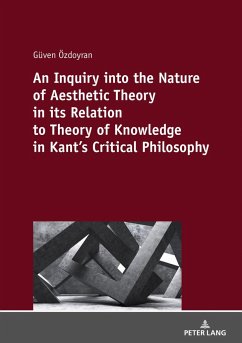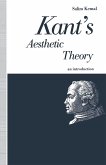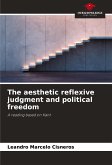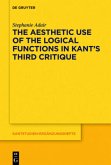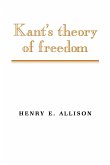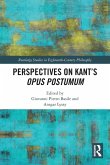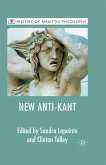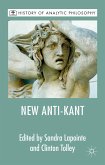Güven ÖZDOYRAN
An Inquiry into the nature of aesthetic theory in its relation to theory of knowledge in Kant's critical philosophy
Güven ÖZDOYRAN
An Inquiry into the nature of aesthetic theory in its relation to theory of knowledge in Kant's critical philosophy
- Broschiertes Buch
- Merkliste
- Auf die Merkliste
- Bewerten Bewerten
- Teilen
- Produkt teilen
- Produkterinnerung
- Produkterinnerung
The primary objective of An Inquiry into the Nature of Aesthetic Theory in Its Relation to Theory of Knowledge in Kant's Critical Philosophy is to investigate Kant's aesthetic theory and its problematic relation to theory of knowledge in his transcendental philosophy. In the Critique of Judgment, Kant constructs his aesthetic theory by arguing that the aesthetic experience is based on a certain type of feeling, namely, the feeling of pleasure, rather than a concept. He grounds such a feeling on the aesthetic judgment of reflection. In spite of its nonconceptual and subjective characteristic,…mehr
Andere Kunden interessierten sich auch für
![Kant's Aesthetic Theory Kant's Aesthetic Theory]() Salim KemalKant's Aesthetic Theory23,99 €
Salim KemalKant's Aesthetic Theory23,99 €![The aesthetic reflexive judgment and political freedom The aesthetic reflexive judgment and political freedom]() Leandro Marcelo CisnerosThe aesthetic reflexive judgment and political freedom33,99 €
Leandro Marcelo CisnerosThe aesthetic reflexive judgment and political freedom33,99 €![The Aesthetic Use of the Logical Functions in Kant's Third Critique The Aesthetic Use of the Logical Functions in Kant's Third Critique]() Stephanie AdairThe Aesthetic Use of the Logical Functions in Kant's Third Critique115,99 €
Stephanie AdairThe Aesthetic Use of the Logical Functions in Kant's Third Critique115,99 €![Kant's Theory of Freedom Kant's Theory of Freedom]() Henry E. AllisonKant's Theory of Freedom37,99 €
Henry E. AllisonKant's Theory of Freedom37,99 €![Perspectives on Kant's Opus postumum Perspectives on Kant's Opus postumum]() Perspectives on Kant's Opus postumum38,99 €
Perspectives on Kant's Opus postumum38,99 €![The New Anti-Kant The New Anti-Kant]() F. PrihonskyThe New Anti-Kant38,99 €
F. PrihonskyThe New Anti-Kant38,99 €![The New Anti-Kant The New Anti-Kant]() F. PrihonskyThe New Anti-Kant75,99 €
F. PrihonskyThe New Anti-Kant75,99 €-
-
-
The primary objective of An Inquiry into the Nature of Aesthetic Theory in Its Relation to Theory of Knowledge in Kant's Critical Philosophy is to investigate Kant's aesthetic theory and its problematic relation to theory of knowledge in his transcendental philosophy. In the Critique of Judgment, Kant constructs his aesthetic theory by arguing that the aesthetic experience is based on a certain type of feeling, namely, the feeling of pleasure, rather than a concept. He grounds such a feeling on the aesthetic judgment of reflection. In spite of its nonconceptual and subjective characteristic, an aesthetic reflective judgment still has a claim to be universally valid. Here, the feeling of pleasure in beautiful is produced by the free harmonious relation between the imagination and the understanding. Judgment, in its reflective employment, does not determine its object but determines the feeling of pleasure in the judging subject. On the other hand, the categories, as pure concepts of the understanding, carry nearly all the weight in his theory of knowledge presented in the Critique of Pure Reason. The imagination, in this case, is strictly bound up by the rules that are imposed by the concepts of the understanding. By this way, judgment, as a cognitive faculty, determines its object and gains its objective validity. In this context, this book discusses the nature of Kant's aesthetic theory and the components that constitute a pure aesthetic judgment of reflection and attempts to clarify its proper place in critical philosophy regarding his theory of knowledge.
Produktdetails
- Produktdetails
- Verlag: Peter Lang
- Artikelnr. des Verlages: 281751
- 1. Auflage
- Seitenzahl: 240
- Erscheinungstermin: 6. April 2020
- Englisch
- Abmessung: 210mm x 148mm x 14mm
- Gewicht: 317g
- ISBN-13: 9783631817513
- ISBN-10: 3631817517
- Artikelnr.: 59162132
- Herstellerkennzeichnung
- Libri GmbH
- Europaallee 1
- 36244 Bad Hersfeld
- gpsr@libri.de
- Verlag: Peter Lang
- Artikelnr. des Verlages: 281751
- 1. Auflage
- Seitenzahl: 240
- Erscheinungstermin: 6. April 2020
- Englisch
- Abmessung: 210mm x 148mm x 14mm
- Gewicht: 317g
- ISBN-13: 9783631817513
- ISBN-10: 3631817517
- Artikelnr.: 59162132
- Herstellerkennzeichnung
- Libri GmbH
- Europaallee 1
- 36244 Bad Hersfeld
- gpsr@libri.de
Güven Özdoyran studied philosophy at Middle East Technical University (METU) in Turkey. He received his doctoral degree from METU and continues his academic studies at Istanbul Arel University, Faculty of Communication. His current research areas are communication theory, media and cultural studies, sociology of communication.
Acknowledgments ............................................................................................. 11
1 Introduction .................................................................................................... 13
2 Kant's Theory of Reflective Judgment .................................................. 19
2.1. General Description of Reflective Judgment ........................................... 19
2.2. The Problematic Relation between Reflective and Determinative
Judgments ..................................................................................................... 22
2.2.1. Further Remarks on the Issue .......................................................... 28
2.3. The Structure of Kant's Exposition of the Introductions ....................... 32
2.4. The Principle of Purposiveness, the Principle of Systematicity
and Nature: The Need for Reflective Judgment ....................................... 33
2.5. The Supplementary Notions: Technic of Nature, the Specification
of Nature, Analogy and Symbol ................................................................ 46
2.6. Kant's Problematic Transition from the Principle of
Purposiveness and the Principle of Systematicity to the Aesthetic
Theory ........................................................................................................... 57
2.7. The Arguments on the Problematic Relation between the Theory
of Reflective Judgment and the Aesthetic Judgment of Reflection ....... 60
3 Kant's Theory of Aesthetic Judgment of Reflection ....................... 75
3.1. General Description of Aesthetic Judgment of Reflection .................... 75
3.2. Disinterested Nature of Aesthetic Judgment of Reflection .................... 78
3.3. Subjective Universality: The Universal Voice .......................................... 81
3.3.1. "The Key to the Critique of Taste": The First Rupture .................. 87
3.3.1.1. The Two-Acts View or the Double Process
of Reflection ......................................................................... 91
3.3.1.2. The Counter-Arguments to the Two-Acts View
and Alternative Explanations ........................................... 100
3.4. Kant's Aesthetic Formalism: The Subjective Formal
Purposiveness as the Purposiveness without a Purpose ...................... 106
3.4.1. Definitions and the Problem of Causal Relation: The
Second Rupture ............................................................................... 107
3.4.2. Transcendental Aesthetic and the Matter of "Aesthetic Form" . 114
3.5. Exemplary Necessity and Sensus Communis ........................................ 124
3.6. The Harmony of the Cognitive Faculties as the Great Narrative
without a Narrative: The Third Rupture ................................................. 129
3.6.1. Deduction and Kant's Expositions ................................................ 130
3.6.2. Exemplary Arguments for the Harmony of the Cognitive
Faculties ............................................................................................ 137
4 Stage I: Re-Considering the Faculties: Imagination (and
Understanding) ............................................................................................ 149
4.1. General Descriptions ................................................................................ 149
4.2. The Position of Imagination in "A" Deduction ...................................... 151
4.3. The Position of Imagination in "B" Deduction ..................................... 155
4.3.1. Figurative Synthesis and Intellectual Synthesis ........................... 160
4.4. Schematism and the Implications of the Synthesis of Imagination .... 164
4.4.1. The Difference between the Apprehension of an Event and
the Apprehension of an Object ...................................................... 168
4.5. Re-Examination of the Free Harmony of the Cognitive
Faculties: The Last Attempt ...................................................................... 172
4.6. Concluding Remarks ................................................................................ 194
5 Stage II: Re-Considering the Faculties: Reason (and
Understanding) ............................................................................................ 197
5.1. Reason and Its Relation to Understanding in the System of
Transcendental Dialectic .......................................................................... 197
5.2. Transcendental Ideas as the Pure Concepts of Reason ........................ 202
5.3. Cosmological Ideas and the Synthesis of Conditions .......................... 205
5.3.1. The Distinction between Mathematical Synthesis and
Dynamical Synthesis ....................................................................... 207
5.4. Reason as a Higher Faculty: Regulative Employment of the Ideas ..... 212
5.5. Re-Examination of the Principles and the Nature as the Ground
for the Reflective Judgment ..................................................................... 220
5.6. Concluding Remarks ................................................................................ 224
6 Conclusion ..................................................................................................... 227
Bibliography ....................................................................................................... 235
1 Introduction .................................................................................................... 13
2 Kant's Theory of Reflective Judgment .................................................. 19
2.1. General Description of Reflective Judgment ........................................... 19
2.2. The Problematic Relation between Reflective and Determinative
Judgments ..................................................................................................... 22
2.2.1. Further Remarks on the Issue .......................................................... 28
2.3. The Structure of Kant's Exposition of the Introductions ....................... 32
2.4. The Principle of Purposiveness, the Principle of Systematicity
and Nature: The Need for Reflective Judgment ....................................... 33
2.5. The Supplementary Notions: Technic of Nature, the Specification
of Nature, Analogy and Symbol ................................................................ 46
2.6. Kant's Problematic Transition from the Principle of
Purposiveness and the Principle of Systematicity to the Aesthetic
Theory ........................................................................................................... 57
2.7. The Arguments on the Problematic Relation between the Theory
of Reflective Judgment and the Aesthetic Judgment of Reflection ....... 60
3 Kant's Theory of Aesthetic Judgment of Reflection ....................... 75
3.1. General Description of Aesthetic Judgment of Reflection .................... 75
3.2. Disinterested Nature of Aesthetic Judgment of Reflection .................... 78
3.3. Subjective Universality: The Universal Voice .......................................... 81
3.3.1. "The Key to the Critique of Taste": The First Rupture .................. 87
3.3.1.1. The Two-Acts View or the Double Process
of Reflection ......................................................................... 91
3.3.1.2. The Counter-Arguments to the Two-Acts View
and Alternative Explanations ........................................... 100
3.4. Kant's Aesthetic Formalism: The Subjective Formal
Purposiveness as the Purposiveness without a Purpose ...................... 106
3.4.1. Definitions and the Problem of Causal Relation: The
Second Rupture ............................................................................... 107
3.4.2. Transcendental Aesthetic and the Matter of "Aesthetic Form" . 114
3.5. Exemplary Necessity and Sensus Communis ........................................ 124
3.6. The Harmony of the Cognitive Faculties as the Great Narrative
without a Narrative: The Third Rupture ................................................. 129
3.6.1. Deduction and Kant's Expositions ................................................ 130
3.6.2. Exemplary Arguments for the Harmony of the Cognitive
Faculties ............................................................................................ 137
4 Stage I: Re-Considering the Faculties: Imagination (and
Understanding) ............................................................................................ 149
4.1. General Descriptions ................................................................................ 149
4.2. The Position of Imagination in "A" Deduction ...................................... 151
4.3. The Position of Imagination in "B" Deduction ..................................... 155
4.3.1. Figurative Synthesis and Intellectual Synthesis ........................... 160
4.4. Schematism and the Implications of the Synthesis of Imagination .... 164
4.4.1. The Difference between the Apprehension of an Event and
the Apprehension of an Object ...................................................... 168
4.5. Re-Examination of the Free Harmony of the Cognitive
Faculties: The Last Attempt ...................................................................... 172
4.6. Concluding Remarks ................................................................................ 194
5 Stage II: Re-Considering the Faculties: Reason (and
Understanding) ............................................................................................ 197
5.1. Reason and Its Relation to Understanding in the System of
Transcendental Dialectic .......................................................................... 197
5.2. Transcendental Ideas as the Pure Concepts of Reason ........................ 202
5.3. Cosmological Ideas and the Synthesis of Conditions .......................... 205
5.3.1. The Distinction between Mathematical Synthesis and
Dynamical Synthesis ....................................................................... 207
5.4. Reason as a Higher Faculty: Regulative Employment of the Ideas ..... 212
5.5. Re-Examination of the Principles and the Nature as the Ground
for the Reflective Judgment ..................................................................... 220
5.6. Concluding Remarks ................................................................................ 224
6 Conclusion ..................................................................................................... 227
Bibliography ....................................................................................................... 235
Acknowledgments ............................................................................................. 11
1 Introduction .................................................................................................... 13
2 Kant's Theory of Reflective Judgment .................................................. 19
2.1. General Description of Reflective Judgment ........................................... 19
2.2. The Problematic Relation between Reflective and Determinative
Judgments ..................................................................................................... 22
2.2.1. Further Remarks on the Issue .......................................................... 28
2.3. The Structure of Kant's Exposition of the Introductions ....................... 32
2.4. The Principle of Purposiveness, the Principle of Systematicity
and Nature: The Need for Reflective Judgment ....................................... 33
2.5. The Supplementary Notions: Technic of Nature, the Specification
of Nature, Analogy and Symbol ................................................................ 46
2.6. Kant's Problematic Transition from the Principle of
Purposiveness and the Principle of Systematicity to the Aesthetic
Theory ........................................................................................................... 57
2.7. The Arguments on the Problematic Relation between the Theory
of Reflective Judgment and the Aesthetic Judgment of Reflection ....... 60
3 Kant's Theory of Aesthetic Judgment of Reflection ....................... 75
3.1. General Description of Aesthetic Judgment of Reflection .................... 75
3.2. Disinterested Nature of Aesthetic Judgment of Reflection .................... 78
3.3. Subjective Universality: The Universal Voice .......................................... 81
3.3.1. "The Key to the Critique of Taste": The First Rupture .................. 87
3.3.1.1. The Two-Acts View or the Double Process
of Reflection ......................................................................... 91
3.3.1.2. The Counter-Arguments to the Two-Acts View
and Alternative Explanations ........................................... 100
3.4. Kant's Aesthetic Formalism: The Subjective Formal
Purposiveness as the Purposiveness without a Purpose ...................... 106
3.4.1. Definitions and the Problem of Causal Relation: The
Second Rupture ............................................................................... 107
3.4.2. Transcendental Aesthetic and the Matter of "Aesthetic Form" . 114
3.5. Exemplary Necessity and Sensus Communis ........................................ 124
3.6. The Harmony of the Cognitive Faculties as the Great Narrative
without a Narrative: The Third Rupture ................................................. 129
3.6.1. Deduction and Kant's Expositions ................................................ 130
3.6.2. Exemplary Arguments for the Harmony of the Cognitive
Faculties ............................................................................................ 137
4 Stage I: Re-Considering the Faculties: Imagination (and
Understanding) ............................................................................................ 149
4.1. General Descriptions ................................................................................ 149
4.2. The Position of Imagination in "A" Deduction ...................................... 151
4.3. The Position of Imagination in "B" Deduction ..................................... 155
4.3.1. Figurative Synthesis and Intellectual Synthesis ........................... 160
4.4. Schematism and the Implications of the Synthesis of Imagination .... 164
4.4.1. The Difference between the Apprehension of an Event and
the Apprehension of an Object ...................................................... 168
4.5. Re-Examination of the Free Harmony of the Cognitive
Faculties: The Last Attempt ...................................................................... 172
4.6. Concluding Remarks ................................................................................ 194
5 Stage II: Re-Considering the Faculties: Reason (and
Understanding) ............................................................................................ 197
5.1. Reason and Its Relation to Understanding in the System of
Transcendental Dialectic .......................................................................... 197
5.2. Transcendental Ideas as the Pure Concepts of Reason ........................ 202
5.3. Cosmological Ideas and the Synthesis of Conditions .......................... 205
5.3.1. The Distinction between Mathematical Synthesis and
Dynamical Synthesis ....................................................................... 207
5.4. Reason as a Higher Faculty: Regulative Employment of the Ideas ..... 212
5.5. Re-Examination of the Principles and the Nature as the Ground
for the Reflective Judgment ..................................................................... 220
5.6. Concluding Remarks ................................................................................ 224
6 Conclusion ..................................................................................................... 227
Bibliography ....................................................................................................... 235
1 Introduction .................................................................................................... 13
2 Kant's Theory of Reflective Judgment .................................................. 19
2.1. General Description of Reflective Judgment ........................................... 19
2.2. The Problematic Relation between Reflective and Determinative
Judgments ..................................................................................................... 22
2.2.1. Further Remarks on the Issue .......................................................... 28
2.3. The Structure of Kant's Exposition of the Introductions ....................... 32
2.4. The Principle of Purposiveness, the Principle of Systematicity
and Nature: The Need for Reflective Judgment ....................................... 33
2.5. The Supplementary Notions: Technic of Nature, the Specification
of Nature, Analogy and Symbol ................................................................ 46
2.6. Kant's Problematic Transition from the Principle of
Purposiveness and the Principle of Systematicity to the Aesthetic
Theory ........................................................................................................... 57
2.7. The Arguments on the Problematic Relation between the Theory
of Reflective Judgment and the Aesthetic Judgment of Reflection ....... 60
3 Kant's Theory of Aesthetic Judgment of Reflection ....................... 75
3.1. General Description of Aesthetic Judgment of Reflection .................... 75
3.2. Disinterested Nature of Aesthetic Judgment of Reflection .................... 78
3.3. Subjective Universality: The Universal Voice .......................................... 81
3.3.1. "The Key to the Critique of Taste": The First Rupture .................. 87
3.3.1.1. The Two-Acts View or the Double Process
of Reflection ......................................................................... 91
3.3.1.2. The Counter-Arguments to the Two-Acts View
and Alternative Explanations ........................................... 100
3.4. Kant's Aesthetic Formalism: The Subjective Formal
Purposiveness as the Purposiveness without a Purpose ...................... 106
3.4.1. Definitions and the Problem of Causal Relation: The
Second Rupture ............................................................................... 107
3.4.2. Transcendental Aesthetic and the Matter of "Aesthetic Form" . 114
3.5. Exemplary Necessity and Sensus Communis ........................................ 124
3.6. The Harmony of the Cognitive Faculties as the Great Narrative
without a Narrative: The Third Rupture ................................................. 129
3.6.1. Deduction and Kant's Expositions ................................................ 130
3.6.2. Exemplary Arguments for the Harmony of the Cognitive
Faculties ............................................................................................ 137
4 Stage I: Re-Considering the Faculties: Imagination (and
Understanding) ............................................................................................ 149
4.1. General Descriptions ................................................................................ 149
4.2. The Position of Imagination in "A" Deduction ...................................... 151
4.3. The Position of Imagination in "B" Deduction ..................................... 155
4.3.1. Figurative Synthesis and Intellectual Synthesis ........................... 160
4.4. Schematism and the Implications of the Synthesis of Imagination .... 164
4.4.1. The Difference between the Apprehension of an Event and
the Apprehension of an Object ...................................................... 168
4.5. Re-Examination of the Free Harmony of the Cognitive
Faculties: The Last Attempt ...................................................................... 172
4.6. Concluding Remarks ................................................................................ 194
5 Stage II: Re-Considering the Faculties: Reason (and
Understanding) ............................................................................................ 197
5.1. Reason and Its Relation to Understanding in the System of
Transcendental Dialectic .......................................................................... 197
5.2. Transcendental Ideas as the Pure Concepts of Reason ........................ 202
5.3. Cosmological Ideas and the Synthesis of Conditions .......................... 205
5.3.1. The Distinction between Mathematical Synthesis and
Dynamical Synthesis ....................................................................... 207
5.4. Reason as a Higher Faculty: Regulative Employment of the Ideas ..... 212
5.5. Re-Examination of the Principles and the Nature as the Ground
for the Reflective Judgment ..................................................................... 220
5.6. Concluding Remarks ................................................................................ 224
6 Conclusion ..................................................................................................... 227
Bibliography ....................................................................................................... 235

